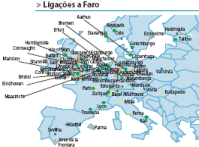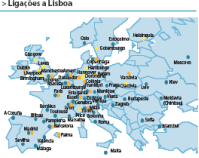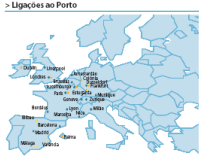General Guidelines
Portugal is one of the favourite European countries for the 'second home' market.
Foreigners mainly concentrate on the Lisbon Coast and the Algarve but other regions are also worth investigating as they offer a wider variety of landscapes and are usually less expensive.
If possible, you should do several visits or stays during different times of the year in the region you are considering in order to confirm your first impressions.
A property seen on a sunny, summer day may not be as attractive when visited on a rainy day.
If you plan to stay in Portugal during the winter, you should have a feeling of it before committing yourself.
Your goal is to find the right property on the right spot, the answers to the questions below should help you in finding it.
Key questions
Climate
Which suits you best?
The Algarve enjoys a lot of sun all year long with mild winters (around 15º - 20º Celsius) and rather hot July & August.
The Alentejo's summer is the hottest of the country but an evening breeze cools down the temperature along the coast.
Lisbon's region, thanks to the proximity of the ocean, benefits of a more moderate climate all year long, never too hot and never to cold. Some winters however can be quite rainy.
The Centre's coast climate is similar to that of Lisbon. Inland winters however can be rather cold, especially around the 'Serra de Estrela' mountains; the only winter sports resource of the country.
Oporto has a similar climate to that of Lisbon with a temperature a few degrees lower.
Medical
How far is the nearest hospital?
Does it have an emergency service?
Schools
Are there International schools in the area?
How is the teaching quality?
Social groups
Are you planning to live in an area with a large foreign community or do you prefer to integrate yourself with the locals? If you choose a touristic beach front resort it will be nearly impossible not to come across expatriates. On the other hand, if you decide to stay in a remote village in the countryside, you should be able to speak Portuguese or at least have very good notions of the language as even if the locals do their best to help you they usually do not speak foreign languages.
Sport facilities
What kind of sport can be practiced and where?
Shopping
Where is the nearest shopping mall?
How many shops and what kind are they?
If you live in a remote rural area you must be much more self-sufficient than if you live in a town and you will need to use the car for everything which will increase your cost of living.
Town or country?
This is exactly the same question you had in your home country. Do you prefer to livein a town or would you rather live in the country?
In a town there is more social life, extended sport centres, night clubs, theatres, cinemas and other cultural centres. The other advantage of a town is certainly a higher standard of health service, including hospitals, first aid stations and specialist doctors. There is also a wider area network of markets, shops and large shopping centres.
On the other hand, in the country you are closer to nature, living in a quiet environment and enjoying full privacy. You will probably find cheaper home to buy but it will probably be needing some restoration to fit your requirements. However, manpower to do this may be difficult to find.
Transport
You need to check the distances between your home and the nearest international airport, train station and bus stop. How is the road network and how far is the nearest highway? Be also aware that during summer time, regions like the Algarve get really busy and the time needed could easily double compared to other seasons of the year.
If you plan to settle down in Portugal the access to airport is not critical but it is better to check how the public transport system works since you or your relatives may have to rely on local bus, train or taxi services
Getting there
One of the major considerations when buying a holiday home is the cost of getting to Portugal. How long will it take to get to a home in Portugal, taking into account journeys to and from airports and railway stations? How frequent are flights or trains at the time(s) of year when you plan to travel? Are direct flights or trains available? Is it feasible to travel by car? What is the cost of travel from your home country to the region where you are planning to buy a home? Are off-season discounts or inexpensive charter flights available? Are costs likely to rise or fall in the future?
If you're planning to buy a property mainly for investment, you should base your decision regarding the location and type of property on its investment potential, rather than on your own preferences.
If you plan to let a property, you must ensure that it is located in a popular area, preferably with year-round letting potential, with good access to a beach and other facilities. It should have, or have access to, a pool and be within easy traveling distance of an airport as most holidaymakers enjoy small trips and rarely want to travel more than 3 hours by car from an airport.
Airline services

Air Connections to Faro

Air Connections to Lisbon

Air Connections to Oporto
Mainland Portugal has three International airports: Lisbon, Faro and Porto. The construction of a new International airport is underway in Alcochete, 25 kilometres east of Lisbon. The existing Lisbon airport has been expanded to cope with a 50% increase of traffic and the Alcochete Airport is currently planned to complement the Portela Airport in the year 2017.
The Portuguese national airline, TAP (Air Portugal), has an outstanding safety record and its standard of service has improved considerably in recent years. TAP has direct flights to Lisbon, Faro and Porto from a number of destinations including Great Britain, Germany, Scandinavia, France, Benelux, Spain, USA, Canada and its fares have also become more competitive.
Major airline companies offer a wide range of flights from European cities to Portugal.
Thanks to the emergence of low cost airlines such as EasyJet, Ryanair, Vueling, Air Berlin, Brussels Airline, Jet2, Flybe, ..., traveling to Portugal has never been so easy and inexpensive making Lisbon, Faro & Oporto very well served all year-round.
Fares
Usually, the earlier the booking the cheaper the cost, but bookings within a week of departure may be charged a lot more or seats may be unavailable. A 3 hour flight from a European Airport is usually charged below 100 € but can cost over 300 € for a last minute booking during peak season.
International Rail Services
To get to Portugal from northern Europe one must take the TGV from Paris to Hendaye (Irún) and from there take the Sud-express train to Lisbon. It will take around 20 hours to get there for a much higher price than a budget airline company. From Madrid it will take another 10 hours to get to Lisbon when an airplane needs approximately one hour for the same trip.
However the EEC funded TGV high speed train linking Madrid to Lisbon and Oporto will change the picture in the coming years.
Getting around
The country is served by regional coaches, trains and domestic airline services. It is quite easy and relatively inexpensive to get around by bus. Taxis are quite common and inexpensive compared to northern European prices.
Car rental
All major rental companies are present in all international airports and major cities. Proof of identity and a valid current driving license is required. Rental prices are considered to be cheap compared to European standards. A small car could be rented for 150 € a week but higher fares are requested for drivers under 25 of age. Be sure to have all documents from the vehicle, your passport and driving license with you. This could be requested by the police during traffic control.
Coaches
Private transport companies such as "Rede Expresso" and the "Eva" service fast non-stop journeys between main cities.
It takes 3 hours and 30 minutes from Lisbon to Porto for 38 € (round trip) and 3 hours and 15 minutes from Faro to Lisbon for 34 € (roundtrip).
Domestic flights
TAP and SATA , the two Portuguese airlines, do service the domestic lines mainland and towards Madeira and the Azores. Flight times and fares on main routes are:
- Lisbon - Porto: 55 Minutes and 140 € round trip during low season
- Lisbon - Faro: 45 Minutes and 160 € round trip during low season
- Lisbon - Ponta Delgada (Azores): 2 hours, 15 minutes and 250 € round trip during low season
- Lisbon - Funchal (Madeira): 1 hour, 40 minutes and 120 € round trip during low season
Private aircrafts and helicopters can also be rented at most airports in Portugal.
Driving
After 10 years of heavy investment, Portugal has built one of the most advanced network of highways both in the North-South axis from Braga to Faro and in the East-West axis towards Spain. Nevertheless be aware that Portugal has one of the highest road death toll in Europe, so it is advised to drive defensively.
Basic driving rules are:
- Drive on the right side of the road
- Unless otherwise indicated, vehicles coming from the right have priority
- Vehicle in a round-about have priority over others entering it
- Speed limits are: max. 120 km/h and min. 50km/h on highways, 90 km/h on roads, 50 km/h in urban zone
- Maximum of 0,5 g/l alcohol is allowed when driving
- Prohibition of speaking on a cell phone when driving unless you use a "hands free" device
- All passenger seat belts must be wornat all times
- Children below 12 years old are required to sit in an appropriate chair at the back of the vehicle
- When fined by the police, on the spot payment is required in cash or with a credit card
Trains
The Portuguese railway system "Caminhos de Ferro Portugues" (CP) provides a very reasonably priced transport within the country. Major lines are fast, efficient, punctual and comfortable. The high speed Alpha train links Lisbon to Vigo passing by Coimbra, Porto and Braga. This will be followed by the TGV construction between Lisbon and Madrid, via Évora and Badajoz. Another link will be under construction linking Faro to Sevilla in Spain.


